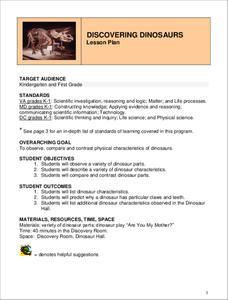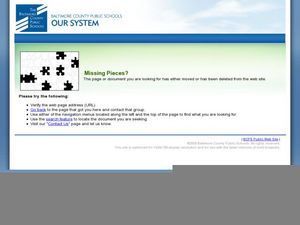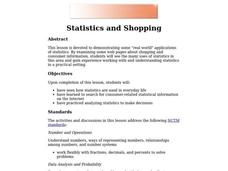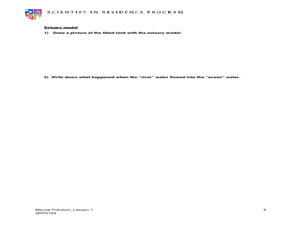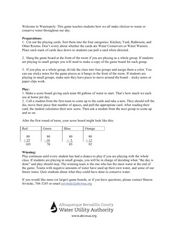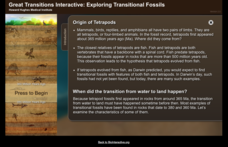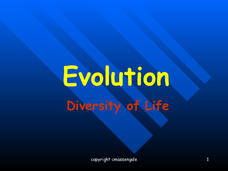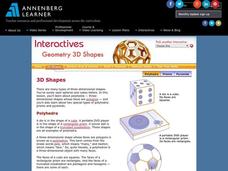Curated OER
Discovering Dinosaurs
Students investigate the physical characteristics of dinosaurs. They participate in a puppet show, take a field trip to a dinosaur museum, and compare/contrast dinosaur characteristics at the museum.
Curated OER
Friendship
Learners identify the characteristics of a good friend and assess themselves as a friend. They practice opening statements to initiate conversation and discuss ways to maintain friendships.
Curated OER
Skeeterville
Learners explore insect life by participating in a role-playing activity. In this mosquito life lesson, students listen to a role-play scenario in which they must protect a town from mosquitoes by creating a field guide about the insect....
Curated OER
Invertebrate Phyla
Young scholars explore the invertebrate phyla. They discuss the characteristics of the invertebrate Phyla in the Kingdom Animal. Students classify organisms into Phyla based on their characteristics. They distinguish radial symmetry,...
Curated OER
Statistics and Shopping
Explore how statistics are used in everyday life. Your soon-to-be savvy consumers use the Internet to find consumer-related statistical information and learn to make wise consumer decisions. Includes links to a practice sheet about data...
Curated OER
Picturing the Successful Student
Sixth graders work in small groups to identify the characteristics of a successful learner. They identify characteristics that think are most helpful for them. Students answer the question: What does a successful student look like?
Curated OER
Little Bees, Big Potential
After reading an article on the alfalfa leafcutting bee, learners chart its characteristics alongside those of the honeybee. Then they draw the leafcutter lifecycle. The article provides fascinating reading when studying the role of...
Curated OER
Something's Fishy
Learners study fish habits and traits. In this marine life lesson, students complete four learning centers of a fish memory game, a fish habitat study, draw and glue fish craft activity, and a fish read-a-thon. Learners complete their...
Curated OER
Modeling Estuaries
Students create a model estuary. In this modeling estuaries lesson, students identify characteristics and mix water of varying densities. Students form a hypothesis, conduct an experiment, and analyze the results.
Curated OER
Wateropoly: Life in the Desert
Students explore water properties by participating in a drought related board game. In this water conservation lesson plan, students play a game titled "wateropoly" which is based on the classic board game Monopoly. Students utilize...
Curated OER
What Lives In A Shell?
Second graders study the readily observable characteristics of marine invertebrates, 2nd graders research the invertebrates and complete worksheets in this series of lessons.
Consortium for Ocean Science Exploration and Engagement (COSEE)
Life in an Ocean World
How does the shell color of crabs and the habitat they live in impact the predator-prey relationship? The fourth lesson in a series of five is a game where participants try not to get eaten if they are a prey and try to eat if they are...
Sea World
Marine Animal Husbandry and Training
Step into the role of a zoo director with several activities about animal training and running a zoo. Kids calculate the amount of food each animal needs, design a habitat for penguins, decide how to breed bottlenose dolphins, and train...
Curated OER
DNA, the Awesome Thread of Life
Students examine how traits are passed to offspring. In this genetic reproduction lesson students develop a model of dna and learn about its structure, replication and function.
Pearson
The Chemical Context of Life
An educational presentation includes atoms, molecules, the four major elements, as well as neutrons and protons. Additionally, slides focus on atomic number, mass number, atomic weight, polar and nonpolar covalent bonding, ionic bonds,...
Howard Hughes Medical Institute
Great Transitions Interactive
How did life evolve from fish to four-limbed animals? Work through an interactive exploring transition animals and comparing their features to understand the transition. Making it even better, the interactive allows scholars to isolate...
Biology Junction
Evolution – Diversity of Life
Scientists noticed animals with backbones share similar bone structure despite having different forms, such as fins, arms, and wings. Young scientists gain an appreciation for evolution by understanding the history of the theory. They...
Curated OER
Masks of Many Cultures: Celebrations of Life
Bring art and society together with this highly creative and interesting lesson. Learners research various uses of masks in ceremonies. They then create a ceremony of their own and a mask to go along with it. They film themselves...
Curated OER
Old McDonald Dice
Old McDonald had a...die with different barnyard animals on it! This fun template will put a new spin on the classic children's song by letting the roll of a die determine which verse to sing next. Consider printing the dice on card...
Sea World
Seals, Sea Lions, and Walruses
Learn about the mammals of the sea with a lesson about seals, sea lions, and walruses. Kids study the characteristics of each pinniped with flash cards and information, and then analyze data about elephant seals, measure heat loss in...
Fall River Schools
Parabolas Are All Around Us
Moving parabolas off of graph paper and into the real world is the task at hand in this detailed poster project. First, learners perform a cumulative activity identifying many characteristics of an assigned quadratic equation. Next, they...
Autism Speaks
Tips for working with participants with Autism
Everyday life can be overwhelming for a student with autism spectrum disorder. An informative presentation guides teachers through definitions of common attributes associated with autism, as well as ways to meet sensory needs to...
Annenberg Foundation
Geometry 3D Shapes: 3D Shapes
Explore vocabulary related to three-dimensional shapes. An instructional website describes the characteristics of different geometric solids. Learners can use an interactive component to view nets, faces, vertices, and edges of common...
Mathematics Vision Project
Module 7: Trigonometric Functions, Equations, and Identities
Show your class that trigonometric functions have characteristics of their own. A resource explores the features of trigonometric functions. Learners then connect those concepts to inverse trigonometric functions and trigonometric...


